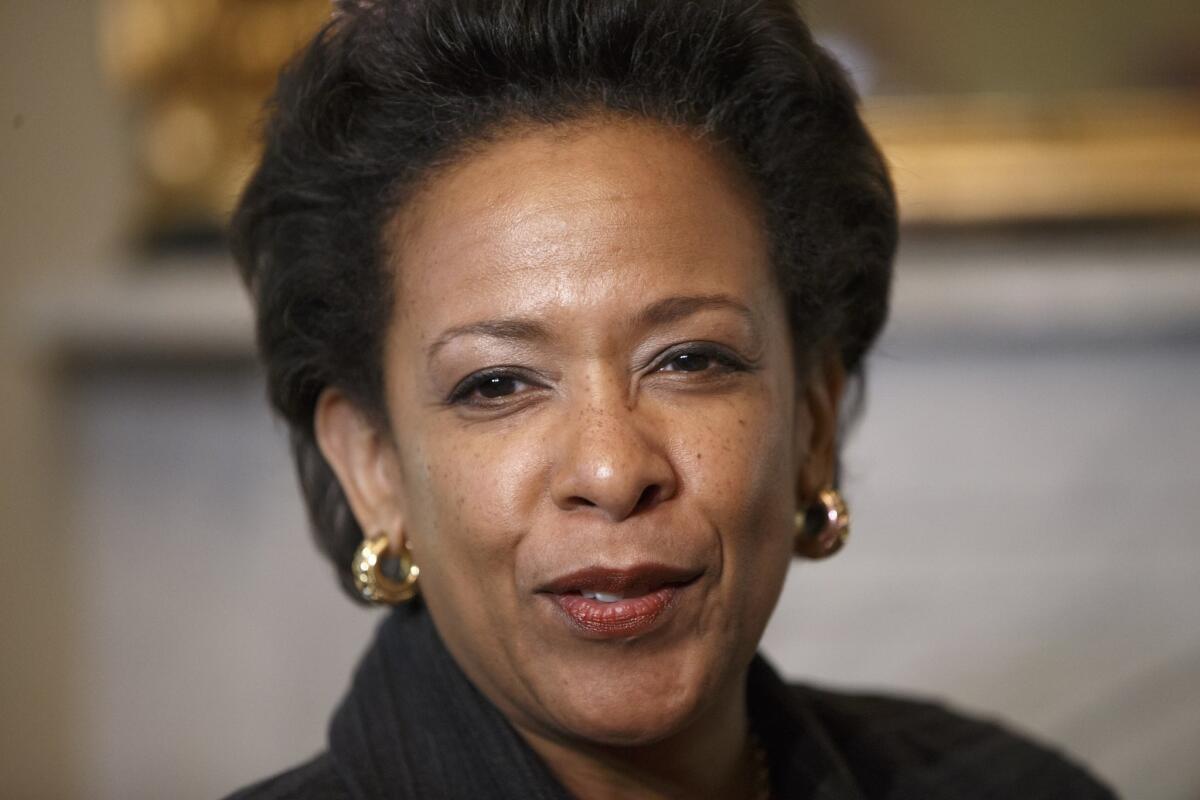Atty. Gen. Loretta Lynch questions plans for moving Guantanamo prisoners to U.S.

Atty. Gen. Loretta Lynch said the transfer of Guantanamo Bay prisoners to the U.S. would be illegal.
- Share via
reporting from washington — Atty. Gen. Loretta Lynch on Tuesday seemed to downplay the Obama administration’s plans to transfer Guantanamo Bay prisoners to the U.S., saying it would be illegal and is “not being contemplated.”
Later, her spokeswoman sought to clarify the remarks, saying Lynch did not intend to preclude any of the president’s options.
Administration officials have repeatedly said they want to close Guantanamo and move some of the remaining prisoners to the U.S. But Congress has rebuffed President Obama’s efforts, including with a recently renewed law that specifically prohibits use of U.S. funds for such a move.
See the most-read stories this hour >>
The Pentagon is preparing a report for the president on alternatives to Guantanamo, and in recent months visited potential replacements in the U.S., including military prisons in South Carolina and Kansas and facilities in Colorado.
But Lynch, testifying before the House Judiciary Committee, was pressed by Rep. Jim Sensenbrenner (R-Wis.) about whether the president has the authority to transfer “some of the world’s most dangerous terrorists” to the U.S.
“The law currently does not allow for that,” Lynch replied. “And that is not, as I am aware of, going to be contemplated given the legal proscriptions.”
Later, in response to a question from the Los Angeles Times, Justice Department Director of Public Affairs Melanie Newman issued a clarification of Lynch’s remarks.
“The Attorney General is aware that the administration is working diligently to finalize the plan to safely and responsibly close the detention facility at Guantanamo Bay, which will be delivered to Congress when complete,” Newman said. “Given the White House focus on this, her comments were intended to prevent speculation on outcomes of that process.”
Some former White House lawyers have argued that the congressional ban is an unconstitutional interference with executive authority.
White House Press Secretary Josh Earnest said last month, “I wouldn’t rule out the president using every element of his authority to make progress,” in closing Guantanamo. National Security Adviser Susan Rice told Reuters that if the administration didn’t close Guantanamo, it would “die trying.”
NEWSLETTER: Get the day’s top headlines from Times Editor Davan Maharaj >>
While several prominent Senate Democrats have backed the president’s authority to circumvent the congressional prohibition, recently some liberal legal scholars have joined Republicans in challenging that view.
Marty Lederman, a Georgetown University law professor and a former top Justice Department official in President Obama’s first term, last week challenged the assertion that the law is unconstitutional.
He wrote on the “Just Security” blog that such a move would require hundreds of government employees to work on new detention facilities to hold the high-value prisoners, “all in the teeth of a law that prohibits the expenditure of funds to do such things.”
Twitter: @timphelpsLAT
ALSO
How John Hinckley, Reagan’s would-be assassin, could go free
In fast-changing Brooklyn, a colony of cats and their king stay constant
More to Read
Sign up for Essential California
The most important California stories and recommendations in your inbox every morning.
You may occasionally receive promotional content from the Los Angeles Times.










